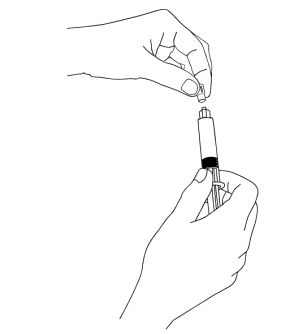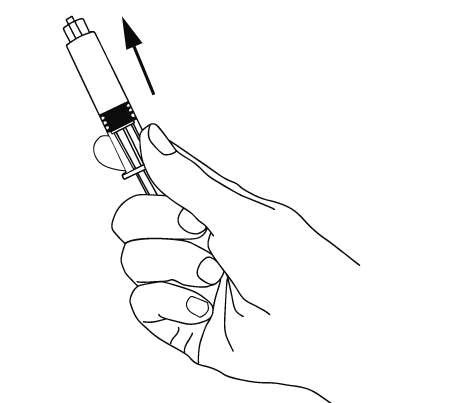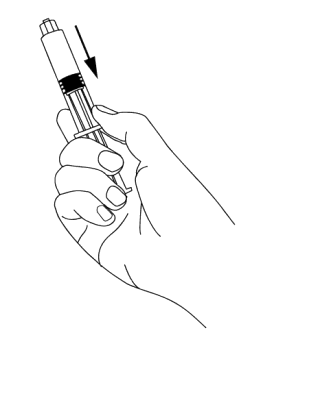
Adenosine Kabi
Ask a doctor about a prescription for Adenosine Kabi

How to use Adenosine Kabi
Leaflet attached to the packaging: information for the user
Adenosine Kabi, 3 mg/ml, solution for injection in a pre-filled syringe
Adenosine
Read the leaflet carefully before using the medicine, as it contains important information for the patient.
- Keep this leaflet, so you can read it again if you need to.
- If you have any doubts, consult a doctor or nurse.
- If the patient experiences any side effects, including any side effects not listed in this leaflet, they should inform their doctor or nurse. See section 4.
Table of contents of the leaflet
- 1. What is Adenosine Kabi and what is it used for
- 2. Important information before using Adenosine Kabi
- 3. How to use Adenosine Kabi
- 4. Possible side effects
- 5. How to store Adenosine Kabi
- 6. Contents of the packaging and other information
1. What is Adenosine Kabi and what is it used for
Adenosine Kabi contains adenosine. It belongs to a group of anti-arrhythmic medicines.
Adenosine Kabi works by slowing down the electrical impulses between the upper and lower chambers of the heart. This slows down a fast or irregular heartbeat called arrhythmia.
Adenosine Kabi is indicated for use in adult patients:
- for the diagnosis of the type of arrhythmia (irregular heartbeat) in the patient;
- to restore a normal heart rhythm in certain types of arrhythmias, called paroxysmal supraventricular tachycardia or Wolff-Parkinson-White syndrome.
2. Important information before using Adenosine Kabi
When not to use Adenosine Kabi
Do not use this medicine if any of the above points apply to the patient.
In case of any doubts, before using Adenosine Kabi, consult a doctor, nurse or pharmacist.
Warnings and precautions
Before starting treatment with Adenosine Kabi, tell your doctor or nurse if:
- the patient has low blood volume (hypovolemia) that is not corrected by appropriate treatment;
- the patient has narrowing of the left main coronary artery supplying blood to the heart (coronary artery stenosis);
- the patient has a heart disease in which the electrical impulses that cause the heart muscle to contract and relax (depolarize and repolarize) take longer than usual (prolonged QT interval);
- the patient has narrowing of the carotid artery. This means that too little blood reaches the brain (cerebrovascular insufficiency);
- the patient has heart disease caused by narrowing of the heart valves;
- the patient has a left-to-right shunt in the heart. This means that blood flows directly from the left side of the heart to the right;
- the patient has disorders of the part of the nervous system called the autonomic nervous system;
- the patient has inflammation of the membrane surrounding the heart (pericarditis) or fluid accumulation around the heart (pericardial effusion);
- the patient has had severe heart failure;
- the patient has had a heart attack or heart transplant in the last year;
- the patient has certain milder heart rhythm disorders (first-degree atrioventricular block or bundle branch block). The symptoms of these diseases may temporarily worsen during treatment with Adenosine Kabi;
- the patient has a certain type of irregular heartbeat, e.g. the heart beats very fast or irregularly (atrial fibrillation or atrial flutter), especially inappropriate electrical activity of the heart (accessory conduction pathway);
- the patient has difficulty breathing (bronchospasm);
- the patient has had seizures or convulsions.
If the patient experiences very slow heartbeat (severe bradycardia), respiratory failure, life-threatening heart rhythm disorders (asystole), severe chest pain (angina pectoris) or very low blood pressure (severe hypotension), Adenosine Kabi should be discontinued immediately.
In case of any doubts whether any of the above warnings apply to the patient, before using Adenosine Kabi, consult a doctor or nurse.
Adenosine Kabi and other medicines
Tell your doctor or nurse about all medicines the patient is taking, has recently taken, or plans to take, including those available without a prescription.
Adenosine Kabi may affect the action of other medicines. Other medicines may also affect the action of adenosine.
In particular, tell your doctor, nurse or pharmacist if the patient is taking any of the following medicines:
- dipyridamole(a medicine used to thin the blood). Inform your doctor if you are taking dipyridamole. The doctor will decide whether to discontinue Adenosine Kabi or stop taking dipyridamole for 24 hours before starting Adenosine Kabi, or reduce the dose of Adenosine Kabi;
- aminophyllineor theophylline(medicines used to improve breathing). The doctor will decide to discontinue these medicines for 24 hours before starting Adenosine Kabi;
- caffeine(sometimes used to treat headaches).
Adenosine Kabi with food and drink
Avoid consuming foods and drinks containing caffeine, such as tea, coffee, chocolate, and cola, for at least 12 hours before starting treatment with Adenosine Kabi.
Pregnancy, breastfeeding, and fertility
Before using the medicine, consult a doctor if the patient:
- is pregnant, may be pregnant, or thinks she may be pregnant; Adenosine Kabi should not be used during pregnancy unless absolutely necessary;
- is breastfeeding; Adenosine Kabi should not be used during breastfeeding.
If the patient is pregnant or breastfeeding, thinks she may be pregnant, or plans to have a child, she should consult a doctor or pharmacist before using this medicine.
Adenosine Kabi contains sodium
The medicine contains less than 1 mmol (23 mg) of sodium per ml, which means it is considered "sodium-free".
3. How to use Adenosine Kabi
Method of administration
Adenosine Kabi is administered in a hospital.
Adenosine Kabi is administered by a doctor or nurse by injection into a vein.
The doctor will closely monitor the patient's heart rate and blood pressure during administration of the medicine.
Dosage
In case of doubts about the use and dosage of Adenosine Kabi, consult a doctor, pharmacist, or nurse.
Adult patients
- The first dose is 3 mg administered over 2 seconds in a rapid intravenous injection.
- If after the first dose the heart rhythm does not improve, a second dose is administered. The second dose is 6 mg administered in a rapid intravenous injection.
- If after the second dose the heart rhythm does not improve, a third dose is administered. The third dose is 12 mg administered in a rapid intravenous injection.
- Do not administer doses greater than 12 mg.
Infants and children
Adenosine Kabi in a pre-filled syringe is not indicated for use in children.
Elderly patients
The recommended dosage is the same as for adult patients.
Using a higher dose of Adenosine Kabi than recommended
Since Adenosine Kabi is administered by a doctor or nurse, it is unlikely that the patient will receive too much of the medicine. The doctor will carefully determine the dose of the medicine to be administered to the patient.
In case of using a higher dose of the medicine than recommended, the following side effects may occur:
- very low blood pressure (severe hypotension);
- slow heartbeat (bradycardia);
- life-threatening heart rhythm disorders (asystole). The doctor will monitor the patient's heart rate during administration of the medicine.
Adenosine is very short-lived in the blood. Therefore, possible side effects that occur after administration of too much of the medicine will probably disappear quickly after discontinuation of the medicine. Sometimes it is necessary to administer medicines such as aminophylline or theophylline intravenously to stop the side effects.
In case of any further doubts about the use of this medicine, consult a doctor or nurse.
4. Possible side effects
Like all medicines, this medicine can cause side effects, although not everybody gets them.
During administration of Adenosine Kabi, the patient may experience side effects.
If any of the following side effects worsen, inform your doctor or nurse, who may discontinue administration of the medicine.
Side effects usually disappear within seconds or minutes after the end of administration of the medicine, but inform your doctor or nurse if any of them occur.
Very common (affect more than 1 in 10 patients):
- flushing of the skin with a feeling of heat;
- slow heartbeat (bradycardia);
- skipped or extra heartbeats;
- heart disorder in which the heart starts beating slower (atrioventricular block);
- life-threatening heart rhythm disorders (asystole) or irregular heartbeat;
- shortness of breath or feeling the need for a deep breath (dyspnea);
- chest pain or feeling of pressure in the chest.
Common (affect less than 1 in 10 patients):
- dizziness or feeling of emptiness in the head;
- nausea;
- headache;
- abnormal sensations on the skin, e.g. burning;
- nervousness.
Uncommon (affect less than 1 in 100 patients):
- blurred vision;
- palpitations, atrial tachycardia;
- metallic taste in the mouth;
- rapid or deeper breathing (hyperventilation);
- feeling of pressure in the head or feeling of heavy arms;
- malaise, weakness or pain;
- sweating.
Rare (affect less than 1 in 10,000 patients):
- severe shortness of breath or difficulty breathing;
- redness, pain or swelling at the injection site;
- feeling of discomfort during injection;
- increased intracranial pressure;
- very slow, fast or irregular heartbeat;
- severe bradycardia (very slow heartbeat).
Frequency not known (cannot be estimated from the available data):
- loss of consciousness or fainting;
- seizures;
- vomiting;
- low blood pressure;
- life-threatening heart rhythm disorders (cardiac arrest);
- respiratory arrest (respiratory failure);
- allergic reactions (including face or throat swelling, and skin reactions such as hives or rash),
- coronary artery spasm, which can lead to a heart attack,
- heart attack (myocardial infarction/unstable angina), especially in patients with narrowed coronary arteries,
- stroke/transient ischemic attack, secondary to the hemodynamic effect of adenosine, including hypotension.
Reporting side effects
If side effects occur, including any side effects not listed in this leaflet, inform your doctor, pharmacist, or nurse. Side effects can be reported directly to the Department of Medicinal Product Monitoring, Urząd Rejestracji Produktów Leczniczych, Wyrobów Medycznych i Produktów Biobójczych, Al. Jerozolimskie 181C, 02-222 Warsaw, tel.: +48 22 49 21 301, fax: +48 22 49 21 309, website: https://smz.ezdrowie.gov.pl. Side effects can also be reported to the marketing authorization holder.
Reporting side effects will help gather more information on the safety of the medicine.
5. How to store Adenosine Kabi
This medicine is stored by a doctor, nurse, or pharmacist in a safe place, out of sight and reach of children.
The medicine should be stored in a place out of sight and reach of children.
Do not use this medicine after the expiry date stated on the carton. The expiry date refers to the last day of the month stated.
Do not store in a refrigerator.
The medicine is for single use. The medicine should be used immediately after opening. Any unused medicine or waste material should be disposed of.
Do not use this medicine if you notice particles or discoloration of the solution.
If you notice any changes in the appearance of the medicine, discard the pre-filled syringe.
Medicines should not be disposed of via wastewater or household waste. Ask your pharmacist how to dispose of medicines no longer required. This will help protect the environment.
6. Contents of the packaging and other information
What Adenosine Kabi contains
- The active substance is adenosine.
Each 1 ml solution contains 3 mg of adenosine.
Each 2 ml solution contains 6 mg of adenosine.
Each 4 ml solution contains 12 mg of adenosine.
- The other ingredients are: sodium chloride, water for injections.
What Adenosine Kabi looks like and contents of the pack
Adenosine Kabi is a clear, colorless solution for injection.
Adenosine Kabi is available in packs containing 1, 6, or 10 pre-filled syringes.
Not all pack sizes may be marketed.
Marketing authorization holder and manufacturer
Marketing authorization holder
Fresenius Kabi Polska Sp. z o.o.
Al. Jerozolimskie 134
02-305 Warsaw
Manufacturer
Fresenius Kabi Austria GmbH
Hafnerstrasse 36
A-8055 Graz
Austria
To obtain more detailed information about this medicine, consult the marketing authorization holder:
Fresenius Kabi Polska Sp. z o.o.
Al. Jerozolimskie 134
02-305 Warsaw
tel.: +48 22 345 67 89
This medicine is authorized in the Member States of the European Economic Area and in the United Kingdom (Northern Ireland) under the following names:
Member State Name of the medicine
Belgium
Adenosine Fresenius Kabi 3 mg/ml, solution for injection in a pre-filled syringe
Denmark
Adenosin Fresenius Kabi
Spain
Adenosina Kabi 3mg/ml solution for injection in a pre-filled syringe
Netherlands
Adenosine Fresenius Kabi 3 mg/ml, solution for injection in a pre-filled syringe
Ireland
Adenosine 3 mg/ml solution for injection in a pre-filled syringe
Poland
Adenosine Kabi
Portugal
Adenosina Kabi
United Kingdom
(Northern Ireland)
Adenosine 3 mg/ml solution for injection in a pre-filled syringe
Italy
Adenosina Kabi
Date of last revision of the leaflet:25.06.2024
---------------------------------------------------------------------------------------------------------------------------
Information intended for healthcare professionals only:
Adenosine Kabi, 3 mg/ml, solution for injection in a pre-filled syringe
To obtain further information, refer to the Summary of Product Characteristics.
Quantitative and qualitative composition
1 ml of solution contains 3 mg of adenosine.
Each 1 ml solution contains 3 mg of adenosine.
Each 2 ml solution contains 6 mg of adenosine.
Each 4 ml solution contains 12 mg of adenosine.
Full list of excipients, see section 6.1 of the Summary of Product Characteristics.
Pharmaceutical form
Solution for injection in a pre-filled syringe.
Therapeutic indications
Rapid restoration of sinus rhythm in paroxysmal supraventricular tachycardia, including cases with accessory conduction pathways (Wolff-Parkinson-White syndrome).
Diagnosis
Aid in the differential diagnosis of supraventricular tachycardia with wide or narrow QRS complexes. Although adenosine is not effective in treating atrial fibrillation or atrial flutter, slowing of conduction through the atrioventricular node facilitates assessment of atrial electrical activity. Sensitization in intracardiac electrophysiological studies.
Dosage and administration
Adenosine Kabi should only be administered in a hospital setting with immediate access to resuscitative equipment.
Adenosine Kabi should only be administered with access to monitoring equipment.
Patients who have developed high-degree atrioventricular block after administration of a given dose of adenosine should not receive further doses.
Dosage
Adult patients
Initial dose: 3 mg administered as a rapid intravenous bolus (over 2 seconds).
Second dose: if paroxysmal supraventricular tachycardia does not terminate within 1 to 2 minutes after administration of the first dose, administer 6 mg also as a rapid intravenous bolus.
Third dose: if paroxysmal supraventricular tachycardia does not terminate within 1 to 2 minutes after administration of the second dose, administer 12 mg also as a rapid intravenous bolus.
Further doses or higher doses are not recommended.
Children and adolescents
Adenosine Kabi in a pre-filled syringe is not indicated for use in children.
Elderly patients
The recommended dosage is the same as for adult patients.
Diagnostic dose
The above dosage scheme should be followed until sufficient diagnostic information has been obtained.
Method of administration
Adenosine should be administered as a rapid intravenous bolus or through an intravenous line. If administered through an intravenous line, the injection should be given as close to the venous access as possible, and immediately followed by rapid administration of 0.9% sodium chloride solution. If administered through a peripheral vein, a large-lumen cannula should be used.
Pharmaceutical particulars
List of excipients
Sodium chloride
Water for injections
Incompatibilities
Do not mix the medicine with other medicines, as compatibility studies have not been performed.
Shelf life
3 years
The medicine should be used immediately after opening.
Special precautions for storage
Do not store in a refrigerator.
Package and packaging contents
Plastic pre-filled syringe with a capacity of 1 ml containing 1 ml of solution (3 mg/1 ml), with a needle shield and a rubber stopper; without needle.
Pack sizes:
1 pre-filled syringe
6 pre-filled syringes
10 pre-filled syringes
Plastic pre-filled syringe with a capacity of 5 ml containing 2 ml of solution (6 mg/2 ml), with a needle shield and a rubber stopper; without needle.
Pack sizes:
1 pre-filled syringe
6 pre-filled syringes
10 pre-filled syringes
Plastic pre-filled syringe with a capacity of 5 ml containing 4 ml of solution (12 mg/4 ml), with a needle shield and a rubber stopper; without needle.
Pack sizes:
1 pre-filled syringe
6 pre-filled syringes
10 pre-filled syringes
Not all pack sizes may be marketed.
Special precautions for disposal
Do not use this medicine if you notice particles or discoloration of the solution.
Any unused medicine or waste material should be disposed of in accordance with local regulations.
Instructions for use of the pre-filled syringe
To administer a dose of 6 mg using a 5 ml pre-filled syringe containing 4 ml of solution (12 mg of adenosine/4 ml), first remove 2 ml of solution from the pre-filled syringe before administering the remaining 2 ml to the patient.
Use in accordance with aseptic principles.
- 1. Remove the needle shield.

- 2. Holding the syringe, push the plunger up to the stop.

- 3. Pull the plunger down to remove the air bubble.

- Country of registration
- Active substance
- Prescription requiredNo
- Manufacturer
- ImporterFresenius Kabi Austria GmbH
- This information is for reference only and does not constitute medical advice. Always consult a licensed doctor before taking any medication. Oladoctor is not responsible for medical decisions based on this content.
- Alternatives to Adenosine KabiDosage form: Solution, 3 mg/mlActive substance: adenosineManufacturer: Cenexi HSC Famar Health Care Services Madrid SAUPrescription not required
Alternatives to Adenosine Kabi in other countries
The best alternatives with the same active ingredient and therapeutic effect.
Alternative to Adenosine Kabi in Ukraine
Alternative to Adenosine Kabi in Spain
Online doctors for Adenosine Kabi
Discuss dosage, side effects, interactions, contraindications, and prescription renewal for Adenosine Kabi – subject to medical assessment and local rules.










